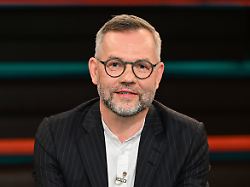Tank talk with Markus Lanz
“Question of speed is essential”
By Marko Schlichting
1/25/2023 5:17 am
The decision was not easy for the Federal Chancellor, but now it is there: Germany is supplying Leopard 2 main battle tanks to Ukraine. Couldn’t that have gone faster? Markus Lanz wants to know from his guests whether the long struggle has harmed Germany.
The breaking news came a few minutes before 7 p.m. Chancellor Olaf Scholz has made his decision: Germany will supply battle tanks to Ukraine. That’s why ZDF talker Markus Lanz asks the question on Tuesday evening in his show: And now? How much does Germany’s reputation suffer from the chancellor’s hesitation?
He didn’t really know anything, but he felt that the decision would be made, says Michael Roth from the SPD. The party’s presidium discussed the issue on Monday. The Chancellor will speak in the Bundestag today, Wednesday. “I was hoping for the deliveries,” says the chairman of the Foreign Affairs Committee, “because Ukraine urgently needs these tanks, but also because I have the impression that there are a large number of European countries that are ready to buy tanks to make available in a team.” In Roth’s opinion, it is reasonable that Chancellor Scholz delayed his decision until Tuesday evening. “I had the impression that there was still a certain need for coordination with some partners.” Roth himself had already proposed the delivery of Leopard 2 tanks last September. But he had to realize that it wasn’t the time for it then.
Christian Mölling cannot defend the chancellor’s hesitation at all. He heads the “Security, Defence, Armaments” program at the German Council on Foreign Relations (DGAP), a think tank founded in 1955 whose members are mainly from industry and politics. Of course he is happy that the decision has now been made in favor of tank deliveries, says Mölling. But he would have liked it to be faster, and he criticizes the way the federal government communicates. The damage for the future is there, Mölling fears. “From now on you will have to pay a risk surcharge for politics, because in future your partners will say: well, if I rely on Germany for existential questions, do I have to go through the same egg dance as I did with the leopard question?” , he says, looking at Michael Roth.
“In the end, the results are right”
He is not particularly enthusiastic about the coalition dispute of the last few days. However, he is happy about the commitments made by Great Britain, France and above all the USA, who want to supply their own battle tanks to the war zone. “In the end, the results are right, even if I would have wished for some things earlier.”
Mölling is more specific: “Germany is not leading at the moment,” he criticizes. It seems as if Germany had to be carried to the hunt. What is important is what the other countries are currently learning from us, says Mölling: “That there are only two groups of partners: on the one hand, the French and the British, who have announced their own arms deliveries to Ukraine. On the other hand, there are the USA, and if the deliveries promise, then Germany will deliver.” The current mistrust of the partners has grown over the years. It is now up to the federal government to turn things around. “For example, the SPD has been saying for years that we want a common European army. But this market is currently falling apart – due to Germany’s inaction.” In order to change that, the government must take the first step, because it is responsible, among other things, for approving arms deliveries. The government is currently reacting too hesitantly, criticizes Mölling. “The issue of speed is essential in this war,” he says. As early as April last year, the Ukrainian army should have been brought up to western standards in terms of armament.
Roth sees it that way. At present, the United States played a central role in this war and in the defense of Europe. On the one hand, one must be grateful to US President Joe Biden for this. But, says Roth: “All in all, this is shameful for the Europeans. And I hope that we learn a lesson from it.”
